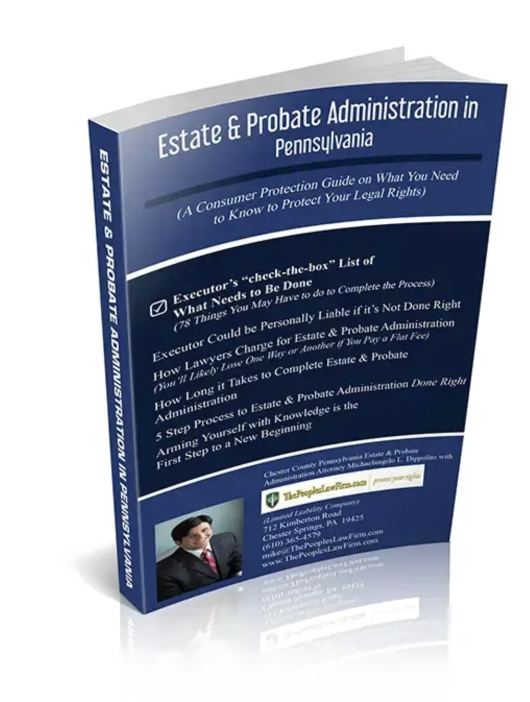Chester County residents lead full, productive lives, resulting in the accumulation of property and assets that are left behind at the end of their lives. Fortunately, there is a legal process that provides a roadmap for managing and distributing a loved one’s estate after they’ve passed away.
Probate administration is a complex but necessary process for managing the distribution of a deceased person’s assets in a way that honors their wishes and complies with the law.
Probate administration can quickly become challenging and may leave the appointed administrator responsible and legally liable for errors that adversely affect beneficiaries, creditors, and even the IRS. Experienced guidance from a Chester County probate lawyer is a key aspect of ensuring the most efficient and legally sound probate administration process.
Who Is Responsible for Probate Administration In Chester County?
A probate administrator is typically the person named in a deceased person’s will or estate plan (which a Chester County will attorney can help file) as the individual trusted to oversee the distribution of the decedent’s remaining assets. Estate planning documents often refer to the administrator as a personal representative, executor, trustee, or agent.
This is typically a trusted relative or family member, such as a spouse, sibling, or adult child. If a person dies without leaving a will or estate plan, the court may appoint a probate administrator, usually a close family member who steps forward. The probate administrator is a fiduciary, meaning they have a legal responsibility to act in the best interests of the estate and its beneficiaries.
For those with estates valued under $50,000, the court may streamline probate through a procedure known as small estate probate, which bypasses the need for a lengthier legal process.
Similarly, assets with named beneficiaries, such as life insurance policies, bank accounts with transfer-on-death designations, and assets a decedent placed in a living trust, may bypass the probate process and pass directly to the designated beneficiary.
What Is the Probate Administration Process in Chester County, Pennsylvania?
If a deceased family member’s estate is too large for the streamlined small estate probate process, the probate administrator must oversee the formal probate process. A Chester County small estate probate attorney can help further with lower valued estates.
The typical probate process proceeds as follows:
- The named personal representative of the decedent becomes the probate administrator and must file the will with the Register of Wills in Chester County (or the county where the decedent resided)
- If the decedent did not leave a will, the court appoints a family member, such as a spouse, adult child, or sibling, as the personal representative
- The probate administrator also files a probate petition with the county’s probate court, also called “Orphans’ Court”, opening the probate case.
- The administrator must pay a probate fee based on the value of the estate.
- The court issues the probate administrator documents known as “Letters Testamentary” to the named probate administrator or “Letters of Administration” to the court-appointed representative if the decedent did not have a will.
- The probate administrator must notify the beneficiaries, creditors, and the public that they’ve begun the probate process. Typically, notifying the public requires publication in newspapers.
- The probate administrator must inventory the estate’s assets, pay creditors, and fulfill tax obligations. In some cases, this requires selling property belonging to the estate.
- Pennsylvania requires the probate administrator to file periodic status report updates on the probate process, noting any sale of property that took place to pay creditors or taxes.
Finally, after debts and taxes have been paid, the probate administrator’s role requires them to distribute the remaining property and assets to beneficiaries as named in the decedent’s will or under the state’s intestacy laws for inheritance if the decedent did not leave an estate plan.
An experienced probate lawyer provides crucial legal guidance throughout the above process.
How Long Do I Have Before I Begin the Probate Administration Process In Chester County, PA?
There is no legally determined amount of time after a death to begin probate, but it’s beneficial to act promptly to begin the probate process, typically following the funeral. The law requires the inheritance tax to be paid within 9 months after the death to avoid penalties. Paying estate taxes within three months of the death provides a 5% discount.
The average probate process in Pennsylvania takes between 9 and 18 months, so prompt action ensures the most timely settlement of an estate. Under Title 20 Chapter 31 § 3133, the law states the following:
“A will offered for original or subsequent probate more than one year after the testator’s death shall be void against a bona fide grantee or holder of a lien on real estate of the testator if the conveyance or lien is entered of record before the will is offered for probate.”
In other words, a creditor may not file a claim against the estate for an unpaid debt if more than a year has passed since the death.
Why Do I Need a Probate Lawyer In Chester County?
A probate administrator is a fiduciary with a legal obligation to oversee the administration of a decedent’s estate in a way that complies with the law, satisfies creditors, resolves tax burdens, and distributes assets to the appropriate beneficiaries.
A probate administrator may be held personally liable if they fail to carry out their duties in compliance with the law and the expressed wishes of the decedent. The legal question that determines fiduciary liability is: Did the administrator’s action reflect the way a prudent administrator would have carried out their duties under the same circumstances?
If a beneficiary, creditor, or government agency believes their rights haven’t been met, they may bring legal proceedings against the estate administrator. This is known as a surcharge action, and can leave the administrator paying out of pocket, even if the violation was an oversight or misunderstanding.
For this reason, hiring a probate lawyer is the key to ensuring that a careless error, a misunderstanding of the terms of an estate plan, or neglecting the requirements of creditors and government agencies doesn’t leave a probate administrator in an untenable position.
How Can a Probate Lawyer From ThePeoplesLawFirm.com Help?
Experienced guidance and legal counsel from a Chester County probate attorney ensures that a personal representative of a family member’s estate meets all legal requirements and that the probate process honors the wishes and requests of the deceased loved one.
Hiring an attorney to guide you and your family through a personally painful and legally challenging process frees you from additional stress and anxiety so you can focus on grieving your loss while secure in the knowledge that your loved one’s wishes are carried out in the most efficient way possible.
Contact us at ThePeoplesLawFirm.com today to speak to an experienced attorney about your probate administration duties in Chester County through a free phone consultation.





